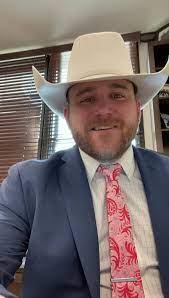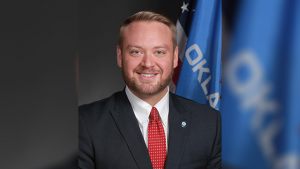
The ROFR bill that Lawton Rep. Trey Caldwell said was not a ROFR bill won approval Thursday in the State….the measure giving an apparent compromised version of the right of first refusal in construction of major transmission lines.
The measure finally hit the House floor where Caldwell spent time being peppered by questions from mostly Democratic members who wondered about what roadblocks such an Act would present for renewable energy in the state.
“This bill will promote more transmission lines,” responded Caldwell in explaining it would allow the state and not the federal government to have a say on construction of such projects.

He later said there were misconceptions about the bill and charged “the well has been poisoned.”
It didn’t take long for opponents to heavily criticize passage of Caldwell’s bill.
“House Bill 4097 is a rotten deal for residential utility customers,” responded Joy McGill, AARP Oklahoma Advocacy Director.
She said the bill mandates an “anti-competitive practice” that will drive rates up even higher for utility customers.
“The bill would allow companies to build new transmission lines but, upon completion, they would be required to sell those lines to the existing utility, such as OG&E or PSO.”
McGill said ratepayers are already facing a proposed combined $550 million rate hikethis year.
“This bill will gouge Oklahomans pocketbooks even more.”
Under the act, competitive bidding would be in the form of utilities seeking lower costs for construction of their transmission lines. Yet, the utilities would continue to own the finished product.
“It would inject more people to bid on a project,” argued Caldwell, adding later in the discussion, “Someone from Oklahoma should have a say and this would give Oklahoma ratepayers oversight.”
The oversight would come from the Oklahoma Corporation Commission.
Caldwell repeated numerous times that the act would create a “natural pushdown on costs.’
“Just by passing this piece of legislation, our consumers, our constituents, our ratepayers in the state of Oklahoma will immediately see at least, a bare minimum, a 1% drop in the overall rising cost,” he avowed.
But during debate, Oklahoma City Rep. Forrest Bennett, a Democrat, stated, “This legislation lends us no guarantee for lowering the rate but no guarantee that none will go up either.”
Oklahoma City Rep. Mickey Dollens argued the last thing ratepayers need is a rate hike and it is time to end government sanctioned monopolies that since statehood have profitted off of their power.
“This bill does the opposite—it further entrenches legacy utilities monopolistic control,” added Dollens who urged legislators to vote no.

“Using government to ban competition means more power for the utilities. Using government to ban competition means less power for senior citizens living on fixed incomes. Using government to ban competition means more money for shareholders. A no vote on this means a yes for the free market. A no vote on this will empower Oklahomans.”
HB 4097 would not require major utilities to allow competitive bidding for the projects. The House announcement of the vote said it was approval of legislation to implement free market princicples and assert states’ rights in high-voltage transmission construction and ownership.
Caldwell authored the bill, which won Committee approval last week. His version of the measure would give Oklahoma the right to decide how critical transmission infrastructure located within the state would be owned and maintained.
“We all know how unpredictable utility bills are, and our constituents are paying more and more every month. Legislators should jump at every opportunity to lower customer costs, especially one that creates the optimal balance of free market principles and states’ rights,” said Caldwell.
Supporters claimed HB4097 expands the pool of potential qualified transmission developers who could enter the competitive bidding process, resulting in lower building costs that are ultimately passed onto consumers.
“Under this new policy, the state would oversee the competitive process and associated rate recovery, clawing back oversight from the federal government,” Caldwell said. “Stakeholders overwhelmingly said they have more success advocating for ratepayers at the OCC than in Washington, D.C. Returning the authority to the elected Oklahoma Corporation Commission ensures Oklahomans have a voice.”
HB4097 eliminates a patchwork grid of accountability by closing regulatory loopholes created by the Federal Energy Regulatory Commission (FERC) that allow unregulated entities to own transmission in our state with no accountability or oversight. The state would maintain greater accountability over critical transmission infrastructure costs and safeguard reliability by requiring the state’s local electric companies to continue to answer to the elected Oklahoma Corporation Commission.
“The Obama Administration forced this policy change on Oklahomans, and utility prices have been rising ever since,” Caldwell said. “By cutting federal government red tape, we can increase competition on the front end, which will naturally reduce the rising rates we are experiencing.”
Caldwell said this policy is a first-of-its-kind in the nation for competitive transmission, but it follows a similar generation model that already exists. The measure, which is not retroactive, would take effect Nov. 1, 2024.
HB4097 passed the House 65 – 29 and is now available for consideration in the Senate, where it is carried by Sen. Lonnie Paxton, R-Tuttle.
YEAS: 65
Baker Hardin May Sneed
Bashore Harris McBride Staires
Blancett Hasenbeck McDugle Stark
Boatman Hefner Moore Sterling
Burns Hilbert Newton Strom
Caldwell (T) Hill Nichols Talley
Conley Humphrey ODonnell Tedford
Cornwell Kane Olsen Townley
Culver Kannady Pae Wallace
Dempsey Kendrix Patzkowsky West (J)
Dobrinski Kerbs Pfeiffer West (K)
Duel Lawson Pittman West (T)
Echols Lepak Provenzano Williams
Fetgatter Lowe (D) Roe Wolfley
Ford Luttrell Schreiber Worthen
George Manger Smith Mr. Speaker
Grego
NAYS: 29
Hays Dollens Maynard Sims
Alonso-Sandoval Fugate McEntire Steagall
Banning Gann Menz Swope
Bennett Goodwin Munson Turner
Boles Johns Ranson Vancuren
Crosswhite Hader Lowe (J) Roberts Waldron
Davis Marti Rosecrants West (R)
Deck
EXCUSED: 7
Archer Cantrell Osburn Stinson
Caldwell (C) Miller Randleman



